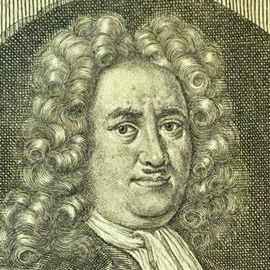Historical-Critical Edition of the correspondence of Christian Thomasius (1655–1728)
Project manager: Dr. Frank Grunert, Prof. Dr. Daniel Fulda
Editors: Dr. Frank Grunert, Dr. Matthias Hambrock, Dr. Martin Kühnel, Dr. Andrea Thiele
Research assistants: Paula Sturm, Moritz Waitschies
Since May 2010 the DFG is funding the preparation and publication of a historical-critical edition of the entire correspondence of the Halle lawyer and philosopher, Christian Thomasius. The project takes into account the extraordinary importance of Thomasius for the formation of the Enlightenment in Germany and fulfils a long-standing need. The systematic edition of these primary sources makes possible for the first time the exact reconstruction and organisation of Thomasius’ multifaceted oeuvre as well as of his biography.
Project Discription
Thomasius: “Knowledge Manager” of the Early Enlightenment
The correspondence provides a multifarious picture of Thomasius as a university teacher in Leipzig and Halle, as a "manager of knowledge", a networker, and a thinker as controversial as combative, who took part in or even initiated important debates of his time. Such discussions involved scientific landscape of central Germany, the fundamental debates of the decades around 1700, as well as radical changes in terms of mentalities, the history of ideas and the social context. In addition, the correspondence conveys information about the local history of Leipzig and Halle, about the various form of governance in Saxony and Brandenburg-Prussia and the effects of pan-European conflicts.
The Network
Among the 277 identified correspondents, big names of the early Enlightenment Res publica litteraria can be found, such as for example Samuel Pufendorf or - even if only a few letters - Gottfried Wilhelm Leibniz. Noteworthy is the correspondence between Thomasius and his patron Duke Moritz Wilhelm of Saxe-Zeitz, which extended over a period of 28 years. The fact that he had numerous contacts with pietists or representatives of nonconformist Protestant faiths is notable, such as for example with Friedrich Breckling, Gottfried Arnold or Pierre Poiret. A great part of the letters come from individuals who are hardly known today, such as pastors, teachers, lawyers and (former) students with whom he usually only exchanged one or very few letters. They address a wide range of topics from different areas of life, and thus scholarly practice can be observed in the variety of its everyday fields of activity. Thomasius communicated and acted on different levels, as teacher, legal advisor, administrative official, citizen and not least as a friend, who was considered as an accomplished interlocutor in the legal, theological, confessional, philosophical, scientific, and political fields.
The Correspondence
The correspondence gathered here, which was scattered over numerous archives in Germany and abroad, is extending from 1679 to Thomasius' death in 1728; it consists of more than 1,200 letters that were either written by Thomasius himself or addressed to him. Two thirds of the manuscript letters come from Thomasius' estate; the rest is mostly the official correspondence with rulers, ministries or university bodies. A surprisingly large number of references to Thomasius' correspondence (in the form of notices or longer quotations) could be found in his own works, in other publications of the time, and in the correspondence of other scholars. Thanks to these testimonies, it is possible to close several gaps in the correspondence.
The edition
The edition consists in a total of 4 volumes of letters, which are supplemented by another volume. The latter contains, aside from the list of sources, references and registers a biographical encyclopaedia of all correspondents and persons mentioned in the letters (with currently contains than 844 names). This dictionary provides invaluable insights into the network of Christian Thomasius. The correspondence of Christian Thomasius will appear as a historical-critical edition to be gradually published by Walter de Gruyter in Berlin. The first two volumes are being prepared for the press: volume 1 includes the correspondence for the years 1679 to 1692 and will be appear in the summer of 2016; volume 2 contains the correspondence for the years 1693 to 1698 and will be published in late 2016. The parallel supplementary volume will appear after the entire edition is in print. Until then, the relevant information for each volume will be made available online.
Publications
- Christian Thomasius: Briefwechsel. Historisch-kritische Edition, vol. 1: 1679–1692, ed. by Frank Grunert, Matthias Hambrock and Martin Kühnel with the collaboration of Andrea Thiele, Berlin/Boston 2017
- Christian Thomasius: Briefwechsel. vol. 2: 1693–1698, ed. by Frank Grunert, Matthias Hambrock and Martin Kühnel, Berlin/Boston 2020


